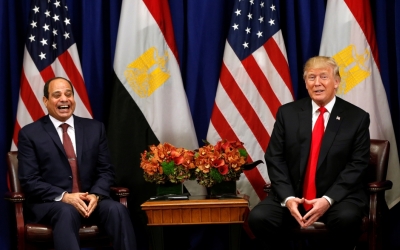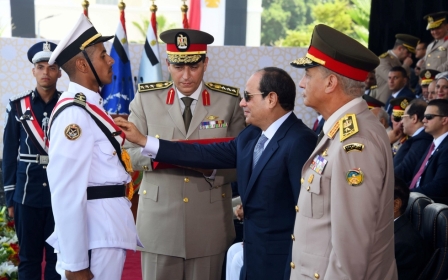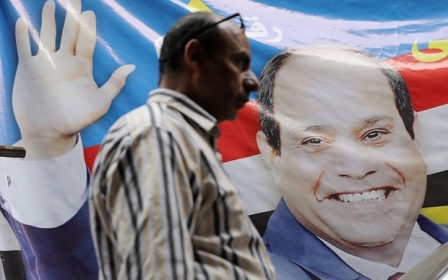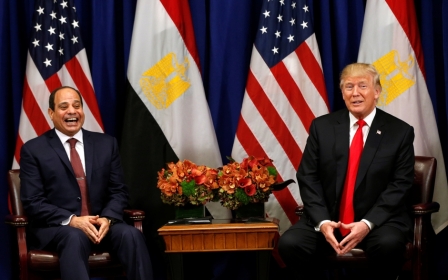Egypt's military shot an American roller skater. Now she's seeking damages

An American citizen grievously wounded by Egypt's armed forces is at the centre of a dispute between the United States and the Cairo government.
While relations between the US and Egypt have been growing closer under the Trump administration, the serious injury to American tourist April Corley, in a mistaken attack by the Egyptian army, has emerged as an obstacle in relations between the two countries at the top echelons of government.
In September 2015, the Egyptian army mistakenly targeted a tour group composed mostly of Mexican tourists and Egyptian tour guides as they travelled through Egypt's Western Desert.
Using Apache helicopters, the armed forces strafed and fired on the tour group, leaving 12 dead.
'With US funds, the Egyptian government bought Apache helicopters, one of which launched a rocket at her tour convey'
- Jared Genser, Corley's lawyer
Some of the dead were pulled from the wreckage, while others had been incinerated. All that remained of one of the tour guides, Ahmed Uweis, was an arm, a leg and a spine.
New MEE newsletter: Jerusalem Dispatch
Sign up to get the latest insights and analysis on Israel-Palestine, alongside Turkey Unpacked and other MEE newsletters
Another nine members of the group were injured, including Corley, a professional roller skater who had appeared in music videos such as Chet Faker's Gold, a Superbowl advertisement, and had trained the pop singer Katy Perry.
Corley was badly injured in the attack, suffering bullet and shrapnel wounds. She sustained injuries to her chest, torso, and arms – injuries that have changed her life irreparably.
After the attack, Corley's condition was so serious that her family had to raise money for an immediate medical evacuation to the United States.
Yet for months afterwards, the roller skater's presence and injury in the Western Desert that day were unclear.
The Egyptian government initially did not believe she had been with the tour group during the attack.
But tour operators confirmed that an American woman had been with the group, and Corley's lawyers were able to present extensive evidence which proved beyond doubt that she had been injured in the attack, had been transported out of Egypt by medevac, and had undergone years of medical treatment for her injuries.
Apache helicopters bought with US funds
One year after the attack, the Egyptian government offered the victims and their families $150,000 as compensation for their injuries.
No offer was made to Corley until May 2017, when Egyptian authorities also offered her $150,000, less than half the cost of the medevac alone, according to her legal team.
Corley and her legal team rejected the offer on the grounds that it was insufficient to cover her medical costs.
While Egyptian authorities said they would welcome a counter offer, when Corley's legal team presented a 40-page survey of damages and out of pocket expenses, along with a compensation amount, they were rebuffed by Egyptian officials, who have thus far refused to offer more, the lawyers said.
"April is an American citizen and innocent victim whose own taxpayer funds support the government of Egypt to the tune of $1.3bn a year," Jared Genser, the director of Perseus Strategies, a human rights legal firm representing Corley, told Middle East Eye.
"With US funds, the Egyptian government bought Apache helicopters, one of which launched a rocket at her tour convey killing many and injuring her," said Genser.
Campaign gains momentum
Corley's case has now reached the highest levels of the US government.
On 15 February, a spending bill signed into law by US President Donald Trump contained a provision stipulating that Secretary of State Mike Pompeo must report back to Congress on the state of ongoing negotiations between Corley and the Egyptian government.
The bill's provision is the result of sustained pressure by the Corley family and their legal team to seek redress.
"This demonstrates quite clearly that the entire body of US government agrees that April deserves appropriate compensation and that this is a serious issue in the bilateral relationship that needs to be resolved," said Genser.
In Congress, representatives familiar with Corley's case are questioning whether foreign governments provided with US military equipment should be immune from ramifications when US citizens are killed or injured by US arms, according to Genser.
"The fundamental question here is when the US provides military assistance and lethal weaponry to foreign governments, what responsibly should those governments have in making sure none of those weapons are used to kill and injure American citizens?" he said.
The Corley campaign has been gaining momentum in Washington. Last May, the vice chairman of the Senate Appropriations Committee, Patrick Leahy, held up $300m in aid to Egypt because of the refusal of the Egyptian government to negotiate with Corley.
US-Egypt relations remain close
Since 1979, the US has provided over $75bn in aid to Egypt. Every year, $1.3bn of of aid is sent in instalments, used principally to purchase American military equipment.
Supporters of Corley's case in Congress are now threatening the flow of funding unless the matter is resolved, and Egypt is at risk of having its aid cut in the next financial year.
MEE understands that behind the scenes both Pompeo and the US ambassador in Cairo have raised Corley's case with senior Egyptian government figures. On 10 January, Pompeo visited Cairo and raised it in person.
However, the US continues to provide Egypt with US military equipment. In November, the state department cleared the potential sale of 10 AH-64E Apache helicopters to Egypt, currently ruled by Abdel Fattah el-Sisi.
"There have continued to be irritants to US-Egypt relations despite the high-level public embrace of the Sisi regime by the Trump administration," Michael Wahid Hanna, a senior fellow at The Century Foundation and a specialist on US policy in the Middle East, told MEE.
However, there is little chance that the general trend of US support for Sisi's Egypt will be affected, as US-Egypt relations appear to be on a "fixed course," according to Hanna.
Retrospective exemption
Corley's legal advisers say they remain open to resolving the matter privately and amicably should the Egyptian government prove willing to provide sufficient compensation for the damage to April's health and life.
For now, the Corley family are continuing their search for restitution.
While the Egyptian government is immune from lawsuits in a US court, under the Foreign Sovereignty Immunity act, Corley's lawyers are looking to insert a retrospectively active exemption for weapons that cause damage to US citizens into next year's spending bill, should the case remain unresolved.
An exemption under the sovereign immunity act would make it possible for any American killed, or injured, by US funded or supplied military equipment to sue the operator responsible in a US court.
While that may give Egyptian authorities pause, the US is unlikely to change course in its Egypt policy.
"Despite the continuation and existence of such irritants to the relationship like the Corley case, there is no evidence to suggest the possibility for major policy shifts on Egypt," said Hanna.
MEE contacted the Egyptian embassy in the US for comment, but did not get a response.
Middle East Eye delivers independent and unrivalled coverage and analysis of the Middle East, North Africa and beyond. To learn more about republishing this content and the associated fees, please fill out this form. More about MEE can be found here.





